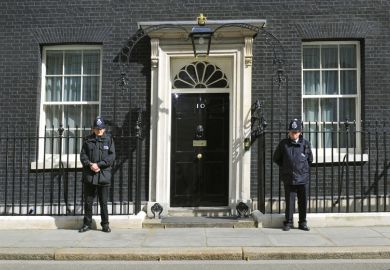I have the greatest of respect for my erstwhile ministerial colleague John Denham, quoted in Times Higher Education defending the decision to situate universities in the Department for Innovation, Universities and Skills – subsequently Business, Innovation and Skills – in 2007.
He may be right that universities have gained some benefits from aligning themselves with the department tasked with economic growth – inevitably a key priority of any government.
But in my view, he is dead wrong in his belief that universities will be worse off in the Department for Education.
As minister for higher education, I disagreed with the move at the time, and I have been a long-standing advocate of a move back to DfE. Quite simply, because I believe that we can better serve the interests of the public and students from that department.
As universities, our core mission is to deliver an outstanding educational experience to all those with the talent and will to take advantage of that opportunity. Progress has been made in widening participation, but the lack of coordination between schools policy, skills policy and university policy has created frustration across the sector.
Universities alone cannot be responsible for fair access and widening participation. It takes strong networks of schools, colleges and universities working in a coordinated way to support students to progress. That is hampered by dividing schools from colleges and universities across government.
The recent Sainsbury Review of skills identified the need for much more clarity in post-16 pathways into further and higher education and employment, with greater provision of bridging support to enable students to transfer from one path to another. The review also identified serious gaps in the provision of information, advice and guidance that could help young people and mature returners to education identify the path that is best for them.
These policies can best be delivered by a single Department for Education that is concerned not just with standards and delivery in each area of education, but the smooth transition between them.
Similarly, delivery of initial teacher training could receive a much-needed boost in coordination. According to a National Audit Office report in February, the government has failed to meet its targets for recruitment of trainee teachers for four years running. Notwithstanding the shift to schools-based provision, universities continue to be heavily involved as delivery partners, sources of expertise and lead providers of initial teacher training.
The move creates an opportunity to bring some order to the chaos and achieve a new settlement for teacher training based on professional and expert dialogue between all the stakeholders in the system.
On a purely practical level, in a Department for Education you are much more likely to encounter officials with a grasp of the principles of education and their application in the higher education environment. A real downside to the business departments is that the movement of officials within that department means that individuals with too little experience or understanding of higher education are tasked with delivering complex policy reforms.
On the argument that higher education will now need to compete with schools for funds, in my experience if you are in the same department the debate can happen in a meaningful way with the relevant ministers present. If the trade-off is across two departments, it happens through the Treasury, where the level of understanding of the value of higher education is lower and the leverage of the sector is reduced.
To the argument that we have better ability within the business department to rebut damaging oversees student policies, I would say that the experience does not bear that out. Wherever higher education is located departmentally, you need a number of different departments all arguing for the advantages of overseas students – the business department, education, the Treasury and the Foreign Office to rebut the Home Office. And on an optimistic note, we should not assume that Theresa May as prime minister will be as regressive on overseas students as she was as home secretary.
Even if you disagree with all of the above, the fact remains that the public at large takes a close interest in the quality of schools, but significantly less in what we are doing in further and higher education, despite the fact that our leaders, our professionals and our key workers are all products of the higher education system.
I am tired of claims that there are too many graduates, or that university degrees are not worth it, when the evidence shows that graduate jobs are growing and graduates gain a significant return on investment from university study. That is before you consider the personal and civic benefits of a higher education degree.
Perhaps we can view this move as a fresh opportunity to remind the public why it matters – hugely – that we deliver on our promise as institutions of education.
Bill Rammell is vice-chancellor of the University of Bedfordshire and former Labour minister for higher education.
Register to continue
Why register?
- Registration is free and only takes a moment
- Once registered, you can read 3 articles a month
- Sign up for our newsletter
Subscribe
Or subscribe for unlimited access to:
- Unlimited access to news, views, insights & reviews
- Digital editions
- Digital access to THE’s university and college rankings analysis
Already registered or a current subscriber?








